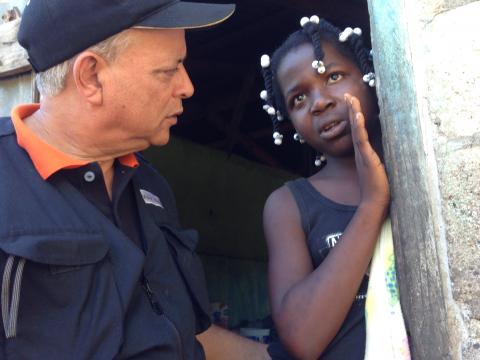A human rights issue is a child health issue

By: James Pedrick,Community Engagement Manager, Global Youth, World Vision International & Sarah Harris, Advocacy & Mobilization Consultant, World Vision Latin America & Caribbean
Normally on Child Health Now, we talk about maternal and child health issues, but today, we wanted to fill you in on a situation happening right now in the Dominican Republic. People who were born in the Dominican Republic, who have never known another country as home, are losing their citizenship.
Why do we care? The health of a child does not begin with pregnancy, it begins with the mother. The situation in the Dominican Republic is preventing children from having an education, but we know that a child born to a literate mother is fifty percent less likely to die before their fifth birthday. People are unable to access health services, but services are essential because healthy moms produce healthy babies. A girl is not the only one affected when rights are taken away. Opportunities for her future children to thrive are also taken away.
Meet Maria Fernanda. She is a 10 year-old sponsored child. She says she wants to be a lawyer when she grows up, but that’s being threatened because of a new sentence by the Dominican Republic’s Constitutional Court. The Court revoked the citizenship rights from all persons born in the country to parents with irregular immigration status. Even more shocking, the ruling will be retroactively applied to all persons born in the Dominican Republic since 1929 – stripping citizenship from thousands of people.
'...Stripping citizenship from thousands of people'.
The policy has been taking place since 2007.
Maria’s mother, Hilda, was first affected in 2011 when the government denied her an identification card even though she was born in the Dominican Republic. Because of her mother’s irregular status, Maria Fernanda is also being denied her birth certificate. In the Dominican Republic, you must show proof of citizenship to continue past the eighth grade and get a new birth certificate for every use.
Even though Maria Fernanda is only in the fourth grade, her school is already asking for her certificate. Hilda fears her daughter will be unable to continue schooling, “If they are already asking for their documents now when they are in the lower grades, when they get to the higher courses, they will not be able to study.”
This policy is affecting much more than just access to education. Maria’s aunt explains, “When we go to the hospitals, it’s like we are no one since we don’t have identification. We don’t have documentation. We don’t exist, we are in limbo. We can’t even get electricity that they send us to the house, because it’s all with your ID. All the purchases are with the ID and when you don’t have papers, what can you do?”
World Vision is mobilising advocates through a campaign called Mi Derecho, Mi Ciudadanía (My Right, My Citizenship) to call upon leaders of the Dominican Republic to restore full citizenship rights to people affected by the Constitutional Court’s sentence. A delegation of World Vision youth advocates (see their video) will be presenting a petition, signed by supporters globally, to the Dominican government on Human Rights Day (December 10).
You can help by adding your name to the petition and joining our Thunderclap campaign on Twitter.